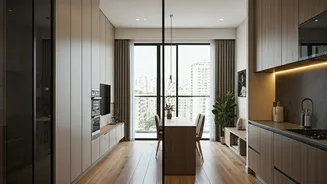Legal Framework Overview
Dividing an apartment in Mumbai is subject to various regulations and legal frameworks. Homeowners must first consult local building codes and municipal
corporation guidelines, which dictate the permissible alterations to a property. Obtaining necessary approvals from relevant authorities is crucial, as unauthorized modifications can lead to penalties or legal complications. These may include building plan approvals, change of use permissions, and compliance certificates. Failing to adhere to these rules can result in significant legal consequences, including fines, and in some cases, the demolition of the unauthorized construction. Therefore, anyone considering dividing their apartment should prioritize understanding and adhering to the legal requirements to ensure a smooth and compliant renovation process. Furthermore, it is advisable to consult legal professionals or architects specializing in property law to navigate the complexities of these regulations effectively.
Building Plan Approval
One of the primary steps in dividing an apartment involves obtaining building plan approval from the relevant municipal authorities. This process entails submitting detailed architectural plans that show the proposed modifications, including the new layout, dimensions, and structural changes. These plans must comply with building codes, fire safety regulations, and zoning laws. The authorities will review the plans to ensure they meet all necessary standards, and they may request revisions if any non-compliance is identified. Approval can take time, sometimes involving multiple rounds of revisions and inspections. Homeowners should anticipate this process by starting early and proactively addressing potential issues. It is also important to engage qualified architects and engineers to prepare the plans and navigate the approval process, which helps to ensure compliance and expedite the process. Careful adherence to the specifications ensures the alterations comply with building codes and the safety and structural integrity of the building.
Structural Considerations Needed
Dividing an apartment also demands careful consideration of structural integrity and safety. Any modification must not compromise the building's stability. Homeowners should involve experienced structural engineers to assess the impact of proposed changes on load-bearing walls, foundations, and other critical elements. These professionals can provide technical specifications and ensure the work is carried out correctly. This may involve reinforcing existing structures, installing new support beams, or modifying electrical and plumbing systems. A structural assessment also helps to identify any potential risks, like water leakage and potential fire hazards, which should be addressed during the renovation. Employing skilled contractors who are familiar with local building standards is essential. Proper planning and professional oversight ensures the safety and durability of the divided units, protecting the property investment and the residents.
Financial Implications Explored
Dividing an apartment has significant financial implications that homeowners must consider. These expenses extend beyond the physical construction and include costs related to legal fees, architectural plans, and municipal approvals. There may also be increased property taxes as the property's assessed value could change after the division. Moreover, homeowners should budget for potential utility upgrades, such as separate metering for water and electricity. If the intention is to rent out one or both units, there are rental income implications as well as the cost of insurance. Calculating these costs accurately is vital to determine the financial viability of the project. Obtaining multiple quotes from contractors, architects, and legal professionals helps in managing these costs effectively. Furthermore, exploring financing options, such as home improvement loans, can help spread out the financial burden and make the project more manageable.
Potential Challenges Unveiled
Homeowners who choose to divide their apartments might encounter several challenges. Navigating bureaucratic processes such as obtaining approvals can be time-consuming and complicated. Delays may arise due to the complexities of the building codes or the need for multiple revisions. Another common challenge is finding suitable contractors and managing the renovation work. Homeowners should conduct thorough due diligence, check references, and have clear contracts. Furthermore, potential disputes with neighbors can occur, especially if the alterations impact shared spaces. Engaging in open communication and seeking mediation when necessary helps to mitigate these issues. The overall project can be stressful and may require patience, careful planning, and proactive problem-solving to overcome these challenges. Staying informed, seeking advice from experts, and being prepared for unforeseen circumstances are essential for a successful division.
Resale Value Considerations
Dividing an apartment can impact its resale value, which will depend on several factors. A well-designed, legally compliant division might increase the property's market value by creating separate, marketable units. However, this depends on market demand, location, and the quality of the renovations. In some cases, a poorly executed or unauthorized division could decrease the resale value. Prospective buyers need to be aware of the compliance and structural integrity. Homeowners should take all these aspects into account. Therefore, any division should be done in compliance with the local regulations. Consulting with real estate professionals can provide insights into market trends and advice to optimize the resale value. Investing in high-quality materials and finishes and maintaining detailed documentation of the renovation can also improve the property's appeal to potential buyers. Careful planning and execution can ensure that the division enhances the property's overall value.




















